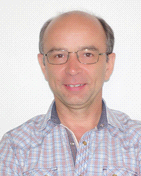报告时间:2022年6月8日15:00-16:00
报告地点:腾讯会议(Tencent Meeting)
会议ID: 588 613 873
报告人: Gilbert Teyssèdre
工作单位:法国国家科学研究中心(CNRS)
举办单位:新葡的京集团8814
报告人简介:

Gilbert Teyssèdre, born in 1966, received his Engineer degree in materials physics and graduated in solid state physics in 1989 at the INSA, Toulouse, France. Then he joined the Solid State Physics Lab in Toulouse and obtained the Ph.D. degree from Paul Sabatier University in 1993 for work on ferroelectric polymers. His research activities concern the development of luminescence techniques in insulating polymers with focus on chemical and physical structure, degradation phenomena, space charge and transport properties. He is currently Senior Researcher at CNRS. He has been head of the Solid Dielectrics and Reliability group at Laplace from 2004 to 2015. He has held numerous governmental and industrial research grants in the field of electrical insulation and has co-authored over 160 contributions to scientific journals and book chapters and 230 conference proceedings. He is member of the scientific committee of several conference series as CEIDP since 2016, ICD, ICEMPE, and JiCable. He is Associate Editor of IEEE Trans. Dielectr. Electr. Insul (2021-).
报告简介:
Solid dielectrics, whether used as electrical insulators or as energy storage components store charges whatever the size of devices (applications related to power engineering, microsystems, microelectronics, etc.). It is actually necessary to implement diagnostic means of the charging state that are fitted to the stresses, environment, nature and geometry of materials in conditions that are representative of their real conditions in the application. In this course, we will review the current limitations with space charge measurement methods based on acoustic or thermal perturbation for sub-µm spatial resolution. Opportunities with techniques derived from scanning probe methods will be presented.


